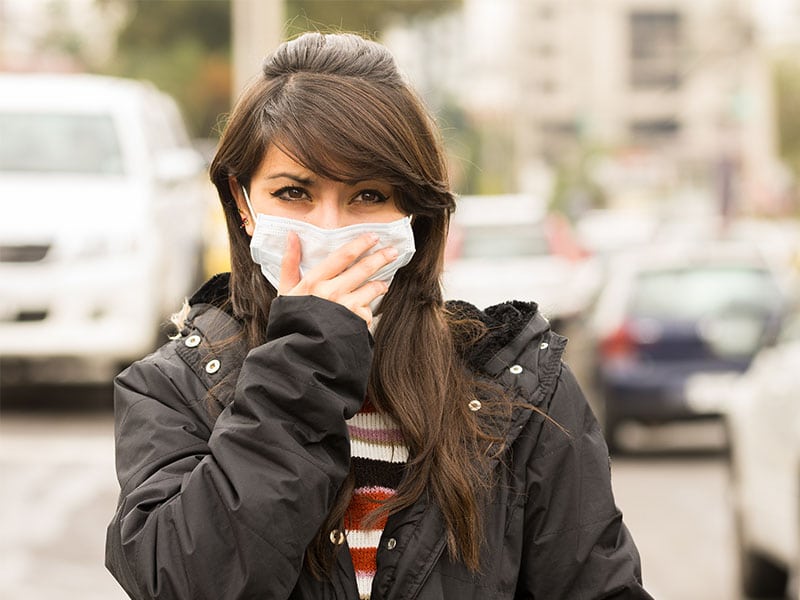Air pollution in Hong Kong presents a serious health risk. While we can’t control the air quality outside, we can take steps to minimise the impact on ourselves – and our kids. Here the Bupa team answers some questions about this ongoing environmental issue in Hong Kong and its effects on our health.
What is air pollution?
Air pollution is when harmful gases, fumes, particles, chemicals and dust are added to the air. It’s produced as a result of motor vehicle exhausts, emissions from factories and industrial plants, and burning fossil fuels. The main air pollutants include carbon monoxide (CO), particulate matter (PM2.5 and PM10), ozone (O3), nitrogen dioxide (NO2) and sulphur dioxide (SO2).
How can it affect our health?
Short-term exposure to air pollution may give you sore eyes, a dry throat and, for some people, a tickly cough. Children and older adults can be particularly vulnerable. Long-term health risks can include cardiovascular disease, chronic obstructive pulmonary disease (COPD), acute lower respiratory infections (affecting your airways and lungs), and lung and bladder cancer.
What are some tips for minimising the effect of unhealthy air days?
• Check the air quality: So you know what to expect for the day ahead, try to check the quality of the air. A useful website for Hong Kong is aqicn.org/city/hongkong, which shows the Real-time Air Quality Index for various parts of the city.
• Know where the highest levels are: Busy roads are often where pollution is highest, and narrow streets surrounded by high buildings where concentration levels can build up. If you’re sensitive to pollution, change your route to avoid busy areas.
• Consider wearing a mask: Certain masks with special filters may protect against very small airborne particles. But it’s important that it fits correctly, with a good seal to prevent particles getting through gaps; masks are usually too big for children. Note that scarves and bandanas won’t be effective against air pollution.
• Take your medicines: If you have a health condition that affects your heart and lungs, including asthma, have your medicines close by. If you don’t feel well, contact your GP for advice, and don’t change medication without advice
• Take it easy: On high-level days, if you have a heart or lung condition, or are an older adult, don’t do too much physical activity.
• Stop smoking: If you smoke and are exposed to air pollution, they’ll both contribute to your risk of lung cancer. If you’re a smoker, seek help to quit.
• Don’t worry unnecessarily: Children don’t need to stay inside or be kept home from school. If your child has asthma, make sure they have their medicine and the school is aware of their condition.
What you can do to help the problem
One of the major things you can do is change how you get around. Leave the car at home, take public transport, cycle, walk or scoot to minimise the amount of car fumes that are released into the air. Not only is it environmentally friendly, it’s cheaper and beneficial to your fitness levels too.
This article was brought to you by Bupa Global.
bupaglobal.com | 2531 8562 | globalplanhk@bupa.com
Disclaimer: This article was designed and produced by Bupa Global by searching internal and external data and information for information provision and reference purposes only. Any views or information mentioned and set out in this article/webpage are based on general situations. Readers should not regard them as medical advices or medical recommendations. Before making any decisions about the theme of this article, you are recommended to seek independent advice from suitable professionals (such as doctors, nutritionists, etc.). It is clearly stated that Bupa Global will not bear any responsibilities for others’ usage or interpretation of the information listed in this article. When preparing and/or updating this article, Bupa Global endeavours to ensure that the content is accurate, complete and updated but will not bear any responsibilities nor make any warranty or guarantee for the accuracy, completeness and timeliness of the information or for any claims and/or losses caused thereby.
See more in our Health & Fitness section:
How to deal with food allergies in kids
Are you getting the sleep you need?
This article first appeared in the October/November 2018 issue of Expat Living magazine. Subscribe now so you never miss an issue.







